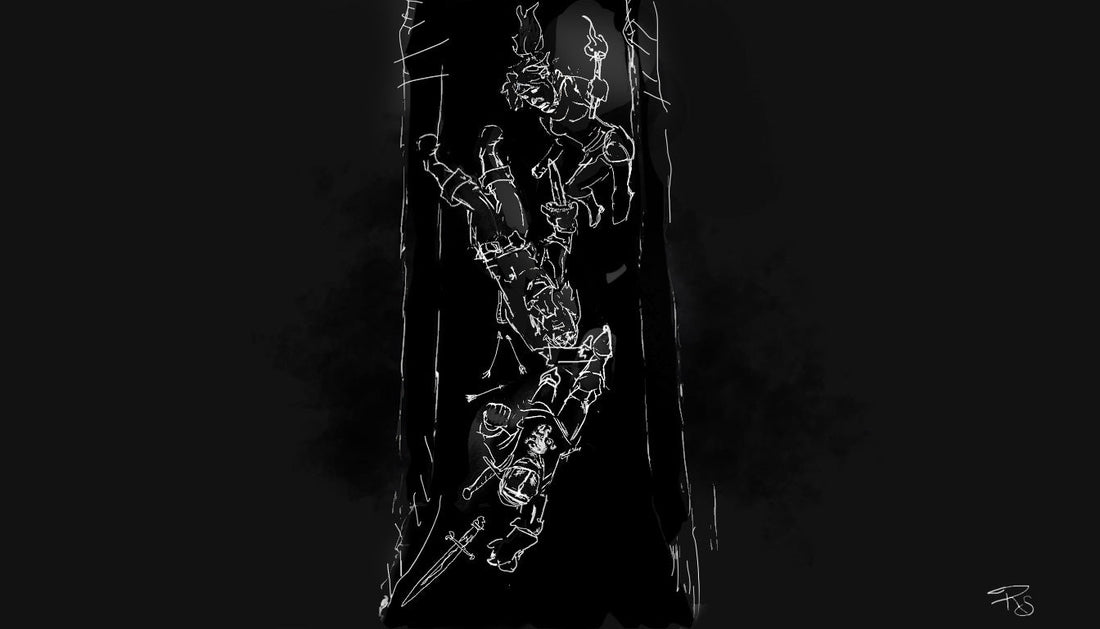
There's always another linchpin ready to pop out
Share
You feel it before you see it—
That shift in the air. The stillness that suddenly becomes too still. Your torch flickers—not from a draft… but from something else. Something waiting.
You steel yourself and continue down the hall. Click. Your boot on a cold stone slab—
Too late.
The floor drops.
The ground disappears beneath your feet and the dungeon swallows you whole. You don’t even have time to yell out. Just fall—and hope you’re quick enough to twist midair, brace, roll—survive.
You didn’t check for traps. Or maybe you did, but this one was hidden better than the others…
A good dungeon has good traps. They need them, or any old fool would empty them and then there'd be no point in you working so hard for that treasure.
Life is no different.
Everything's fine, familiar, comfortable even. One day you're steady—hanging in there. Then, in the blink of an eye, the floor is gone.
- The job you thought was stable? Eliminated.
- The relationship you thought would last forever? One bad convo and you're wondering how tf did they fool you for so long?
- The identity you’ve built your entire life around? Trends change, nobody says "that's tight" anymore—now you're old and lame. You wonder if people once looked at you how you look at younger generations with their dumb hair, weird lingo, and rampant nihilism? (They did.)
You thought you were safe.
You thought you had time to figure it all out.
But trapdoors don’t knock. They don't sit in your inbox waiting for you to find the time.
They drop you.
The Trapdoor Isn’t the Enemy—Comfort Is
In every great story, there’s a moment where the hero falls. Usually toward the end of the second act—it's a law.
A pit opens beneath their feet. A secret door slams shut. A betrayal drops them into the depths. They fail their mission. They're not the hero they wanted to be.
It’s not a flaw in the quest…
It is the quest.
Because what makes a hero isn’t how well they avoid danger. It’s how they adapt when the map they're reading by candle light gets burned, or the contents of their waterskin gets replaced by a shrinking potion by some tricky fey.
You’ve seen this before—on the page, on the screen, in your own life:
- The warrior's training was never going to be enough, he needs a training montage after he loses his big fight.
- The rogue who never trusted anyone and only cared about himself surprises everyone by sacrificing himself to save the child after being made to see that the child is him.
- The mage who loses their spell focus and has to learn to tap into something more powerful than any magic—friendship! Psych! They still use magic but in a different way than they thought they could.
What they gain is what we all need:
Not danger sense—not just the ability to sense the shift before the fall. Not paranoia. Not pessimism. But inner security.
To stop relying on the illusion of safety. Start trusting something stronger: yourself.
That’s the truth most people miss.
They try to build a life where nothing can go wrong.
They become obsessed with stability, convenience, approval. They call it “success.” But in reality? It’s just polished fragility.
When you live in fear of the trapdoor, you become soft. When you live expecting it—you become steel.
Because the floor will fall out from under you. It might be next year. It might be next week. There's no maybe—it’s coming.
The question isn’t if. The question is—will you land on your feet?
And that answer is shaped by what you’ve built:
Not your image.
Not your wealth.
Not your network.
Your character.
Because, going back to every great story, it’s not the smooth-talking noble or trend-chasing mage who saves the day. It’s the one who faced loss. Who took the fall. And who climbed back up and went back to work.
You Don’t Need Certainty—You Need Stability Within
Trapdoors aren’t bugs in the system—they’re features. Built into the dungeon. Built into life.
The floor always falls eventually. Nobody arrives at the end of a good story without being made to grow along the journey.
No amount of status, success, strategy, pma will protect you from the shock of change. The only thing that keeps you grounded when the ground falls out… is who you become before the fall.
"The only constant in life is change"-Heraclitus
Think about this for a sec… There are people still alive today who have lived through multiple ages of mankind. It's like Sid Meyers Civ:
- The tail-end of the steam age
- The rise of oil
- The dawn of the nuclear era
- The arrival of microprocessors
- The shift from radio to tv to computers to…
- The explosion of the internet
- And now… AI… unfolding faster than anything that came before it
Entire industries disappeared. Empires rose and fell. Ideas that ruled the world yesterday became today's punchlines.
The world they were born in isn’t the world they live in now—and it won’t be the world that exists tomorrow.
And yet, many of them endured. Even thrived.
Not because they had every detail figured out. But because they developed something more than powers of prediction:
Adaptability. Awareness. Inner stability. Character.
These are the qualities you build when you expect the trapdoor. When you stop asking “How do I avoid chaos?” And start asking “How do I become someone who can be stable when everyone else is losing their minds? How can I be the strongest person at my father's funeral?”
Because in a world that will absolutely shift beneath your feet, your edge isn’t gonna be perfect planning. It’s resilience. It’s how you hold your sword while the room is spinning.
Once you accept that you’ll never control conditons—you'll never fully control the dungeon…You can finally start to master it.
Train for the Trapdoor Before It Opens
You don’t need to see the danger coming. You need to know that you're gonna endure.
Here’s how to train your danger sense before the floor drops:
1. Audit Your Trapdoors
Ask yourself: What in your life—if it collapsed today—would wreck you tomorrow? A relationship? Your job? Your identity? Don’t live in fear of it—but name it. Because what you name, you can prepare for. You can make peace with the things you can't change, and work your ass off to fix the things that need fixing.
2. Bump Your Stats
You don’t need to dodge every crisis. You just need to land better than you used to.
That means:
- Move your body.
- Strengthen your nervous system.
- Journal before you spiral.
- Breathe like it matters—because it does. Your mood can be completely changed with a few focused breaths.
Build agility before you need it.
3. Set Your Fallback Gear
When the trapdoor opens, what catches you? Not saviors. Systems. A simple ritual. A supportive person. A place to land. Build your buffer before you fall.
4. Create Margin Like It’s Sacred
Chaos doesn’t make appointments. Don't schedule your life at 100% capacity. Leave room for the unexpected—energy, time, finances, most important of all—focus.
Margin is magic when things go wrong.
5. Train in Chaos, Not Perfection
Build your routines for the worst cases. Routines are easy when life is smooth. The real test is what you can maintain during the inevitable storms of hellfire and agony.
- Ten minutes of movement.
- Five minutes of presence.
- One controlled breath before reacting.
It doesn’t have to be pretty. It just has to hold.
The floor will drop.
Not because you failed—but because that’s how the dungeon is built.
But if you prepare now—if you build the strength, the stillness, the skill—
You won’t just survive the fall. You’ll land on your feet.
And when the dust clears, you’ll be the one still standing—ready to move forward, while everyone else is still looking for the ground that nearly killed them.
Train. Roll with the fall. The trapdoor isn’t your end—it’s your initiation.
-Rex
ps. Hi, mom.
